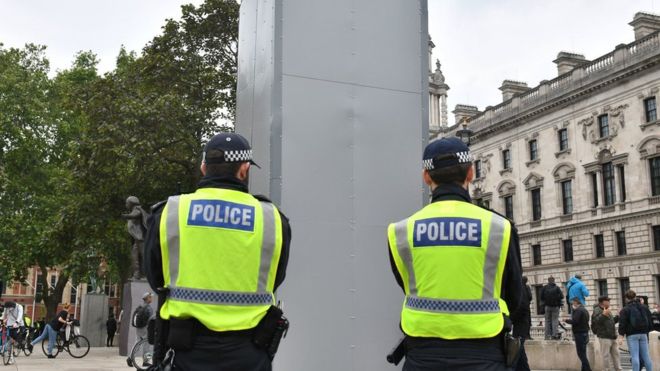A sculpture of Winston Churchill may be placed in a gallery to ensure it if exhibits proceed, his granddaughter has said.
Emma Soames told the BBC the war-time head administrator was a “mind-boggling man” however he was viewed as a saint by millions.
She said she was “stunned” to see the landmark in London’s Parliament Square blocked, in spite of the fact that she understood why it was necessary to do so.
It came after protesters daubed “was a racist” on the sculpture a weekend ago.
Ms. Soames said it was “remarkably dismal that my granddad, who was such a bringing together figures in this nation, appears to have become a sort of icon through being controversial.”
“We’ve come in these present circumstances place where history is seen just completely through the crystal of the present,” she told BBC Radio 4’s Today program.
Ms. Soames recognized her granddad had frequently held perspectives which “especially now are viewed as inadmissible however weren’t really at that point”.
Be that as it may, she included: “He was an amazing, complex man, with infinitely more good than bad in the ledger of his life.”
She said if individuals were “so incensed” by observing the statue it may be “safer” in a museum.

“But I think Parliament Square would be a less fortunate spot without him,” she included.
Notwithstanding, writer Shrabani Basu, who has composed books about the British Empire, said there were “different sides of Churchill” and “we have to realize his breaking point just as his best hour”.
She contended that in India, Churchill isn’t viewed as a legend, referring to his job in the 1943 Bengal starvation, during which at least three million people are believed to have died.
While Ms. Basu said she would not like to see the sculpture expelled from Parliament Square, she said individuals ought to be instructed “the entire story” about the war-time figure.
Black Lives Matter dissident Imarn Ayton said sculptures of slave dealers and individuals who had spoken contrarily towards individuals of color were “extremely offensive” and should be moved to museums.
“I believe it’s a success win to everybody so we no longer insult the dark country and we also get the opportunity to keep our history,” she told the BBC.
On Friday, Prime Minister Boris Johnson marked the blocking of the sculpture to shield it from expected vandalism as “absurd and shameful”.
Mr. Johnson said the former prime minister had expressed opinions that were “unacceptable to us today” but remained a hero for saving the country from “fascist and racist tyranny”.
Read also: Confederate And Columbus Statues Toppled By US Protesters
“We can’t attempt to alter or control our past,” he composed of moves to expel tributes to verifiable figures. “We can’t claim to have an alternate history.”
Winston Churchill, who lived between 30 November 1874 and 24 January 1965, is frequently named among Britain’s most prominent ever individuals yet for a few, he remains an intensely controversial figure.
Despite his leading the country through the darkest hours of World War Two and being prime minister twice, critics point to his comments on race and some of his actions during both world wars.
Churchill told the Palestine Royal Commission that he didn’t concede wrong had been done to Native Americans or Aboriginal Australians as “a stronger race, a higher-grade race, and a worldlier wise race to put it that way has come in and taken their place”.
His supporters contend that he was in no way, shape, or form the main individual to hold these sorts of perspectives during the period.
He also advocated the use of compound weapons, “I am firmly for utilizing harmed gas against uncivilized tribes,” he wrote in a memo..
Another criticism is for his part in the Bengal famine in India in 1943, during which at least three million people are believed to have died after Allied forces halted the movement of food in the region – including through British-run India – following the Japanese occupation of Burma.
The statue in London’s Parliament Square has taken care of in front of a Black Lives Matter dissent in Westminster on Friday evening.
A show made arrangements for Saturday was brought forward by a day because of fears there could be violent clashes with far-right groups.
The Met Police have put limitations on a few gatherings meaning to dissent on Saturday, including expecting shows to end at 17:00 BST.
Other monuments have been removed ahead of separate protests planned over the weekend, while the Cenotaph war memorial, in nearby Whitehall, has also been covered.
Mayor of London Sadiq Khan said other “key statues”, including one of Nelson Mandela, would be ensured, saying there was a hazard sculpture could turn into a “flashpoint for violence”.
It comes after the sculpture of slave broker Edward Colston was tossed into the harbor in Bristol during a Black Lives Matter dissent on Sunday. Demonstrations have been taking place across the world after the passing in the police authority of African American George Floyd in Minneapolis a month ago.
This news is originally posted on BBC.COM


